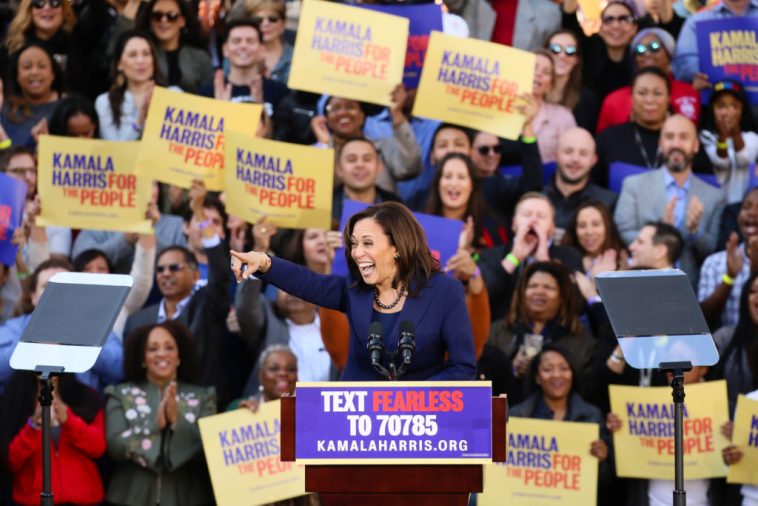Just weeks ago, the establishment Democrats witnessed their flagbearer, President Joe Biden, deliver a tragic performance during a crucial debate. This dismal spectacle sent the party spiralling into a gloomy three-week phase. The countdown to the election was already ticking with a mere four months to spare when the veteran leader, chosen through a controversial primary system, failed to convince the electorate. The reality that many insiders had been concerned about for some time became glaringly apparent: the President was ill-equipped for his role.
Preliminary polling data suggested a potent advantage for the former President, Donald Trump, and hinted at a possible landslide victory. This would not only jeopardize the Democrats’ hopes of holding on to the Senate but also undermine their ambitions to reclaim the House. It was becoming increasingly clear that Biden’s position as the party’s front-runner had become untenable, and it fell on Speaker Nancy Pelosi, former Speaker of the House, to address the situation.
Though Biden demonstrated initial resistance, he eventually came to terms with the reality of the situation. It is understood that Pelosi presented him with a decisive choice, reassuring him that his exit from the race was inevitable. The Speaker’s assertive stance left no room for contestation. Biden was faced with a simple question: to leave graceully or on forced terms.
It was on a quiet Sunday afternoon when Biden finally conceded to the inevitable. In a notice published on platform X, he announced the end of his reelection ambitions. But, this was only half the story. Half an hour later, he posted again, this time as an act of defiance for being pushed out of the race, endorsing Vice President Kamala Harris to take his place as the leading candidate.
Subsequent to his announcement, Harris promptly initiated her presidential campaign. Throughout the rest of the day, her staff contacted delegates across the country, seeking to secure enough commitments to ensure her nomination. The Associated Press confirmed by Monday evening that Harris had indeed succeeded in her goal; her nomination was now almost certain.
The campaign’s success was not only political but financial as well. In the brisk 36 hours following Biden’s withdrawal, the Harris campaign had raised a staggering $100 million. A remarkable $81 million of the total amount was amassed within the first day, setting a new fundraising record in presidential campaign history. The news generated a positive sentiment towards Harris within the party as well as outside of it.
By Monday’s end, the bulk of esatblishment Democrats offered their endorsement to Harris. Additional endorsements arrived on Tuesday from Senate Majority Leader Chuck Schumer and House Minority Leader Hakeem Jeffries. Both leaders were noted expressing optimism and excitement about Harris’s candidacy; a sentiment echoed across the Democratic Party and the country at large.
The media too paid tribute to the party’s impressive recovery. They lauded Harris’s charisma and compared her impact to that of former President Barack Obama. Not only was Harris enjoying a newfound wave of popularity, but there was also a palpable sense of relief within the party regarding Biden’s departure. This rapid transition of power and the ease of its execution demonstrated the considerable influence of the media and its ability to shape public sentiment.
The dramatic shift of power within the party, marked by Biden’s exit and Harris’s ascent, significantly changed the dynamics of the race. Trump had been the odds-on favorite to best Biden, but a showdown against Harris promises to be a more intense battle. It would be a significant miscalculation to underestimate Harris. Despite her flaws, she brings a vitality and eloquence that Biden lacked.
In a recent analysis, Trump’s campaign pollster, Tony Fabrizio, cautioned Republicans to brace themselves for a surge in support for Harris in the upcoming weeks, particularly in the national polls. A Reuters-Ipsos poll published on Tuesday already showed Harris ahead by 2 points. However, Fabrizio noted that the fundamental considerations of the electorate remain the same.
He pointed out that the arrival of Harris does not eliminate voter frustrations around the economy, inflation, crime, border control, housing costs, or international conflicts. Harris will eventually have to face her association with Biden and his administration’s policies, which brought about inflation and border challenges. As voters grow more familiar with Harris’s record pre-Biden, they will scrutinize her previous decisions and actions more closely.
Despite Harris proving to be a fierce candidate, Trump’s capabilities should not be understated. His campaign has witnessed a remarkable string of successes recently. But the most impactful moment was undoubtedly at a Butler, Pennsylvania, campaign rally where a potential assassin’s bullets injured Trump. He responded immediately with a show of defiance that left an indelible mark on public memory.
Trump’s reaction at the rally caused a stir, stirring admiration even from Mark Zuckerberg, Meta’s CEO. In an interview with Bloomberg, Zuckerberg applauded Trump for his courage amidst the crisis. It was labeled the ‘most bada**’ thing Zuckerberg had seen. The subsequent days saw Trump making a triumphant appearance at the Republican National Convention in Milwaukee, earning him booming applause and third presidential nomination.
The Convention proved to be an enormous success, with many attendees professing it to be uplifting, unified, and the best they had ever attended. CNN’s data reporter, Harry Enten, warned Democrats that despite their excitement about Harris’s candidacy, they would still face the challenge of defeating a more popular than ever, Donald Trump.
Enten pointed out that indeed, defeating Donald Trump, who is enjoying greater popularity than ever before, will be arduous. The switch from Biden to Harris might inject fresh energy into the Democratic campaign, but it does little to undermine Trump’s strong appeal.
In essence, while the narrative paints an exciting chapter for the Democratic Party, the ending is yet unknown — the campaign trail is still littered with challenges and hurdles. This article was composed by contributor Elizabeth Stauffer, associated with the Washington Examiner and the Western Journal.


